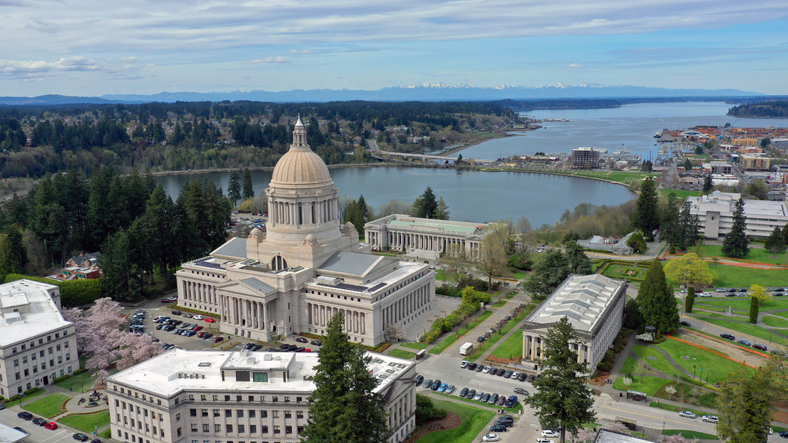The 2025 Washington State legislative session has been one of the most consequential for small businesses in recent memory. Lawmakers, facing a historic, self-created estimated $16 billion budget shortfall, responded with a sweeping package of new taxes and regulatory changes that will reshape the state’s business climate for years to come.
A Flood of New Taxes: The 2025 Tax Package
This session saw the passage of more than twenty new or increased taxes, many of which directly or indirectly target small businesses. The most significant are House Bill 2081 and Senate Bill 5814, both of which will have far-reaching consequences18.
House Bill 2081 (HB 2081) increases the state’s Business & Occupation (B&O) tax rate and introduces a new surcharge on companies with more than $250 million in annual taxable income. While the surcharge is aimed at large corporations, the B&O tax increase will hit small and mid-sized businesses as well. Washington’s B&O tax is already one of the most regressive in the nation, taxing gross receipts rather than profits. This means that even businesses operating on thin margins will pay more, regardless of their profitability.
It’s one of the reasons why Washington is ranked one of the worst places to do business in the US.
Additionally, HB 2081 raises the “advanced computing surcharge” paid by major tech companies, such as Microsoft and Amazon, from 1.22% to 7.5%. While this is capped at $75 million per year, the broader concern is the precedent it sets for targeted taxation of specific industries. These types of taxes are often expanded over time, eventually ensnaring smaller players as revenue needs grow.
Senate Bill 5814 (SB 5814) expands the state’s retail sales tax to include digital and professional service, everything from advertising agencies to software development and IT support. Starting in October 2025, these businesses must collect sales tax from customers. This change is projected to generate $1.1 billion over two years but comes at the cost of making Washington-based service providers less competitive with out-of-state firms, who may not be subject to the same tax. For small businesses, the administrative burden of compliance and the risk of losing clients to lower-cost competitors elsewhere will be significant.
Business leaders have warned that these tax increases could slow economic growth and drive companies out of the state. As Kelly Fukai of the Washington Technology Industry Association noted, “We’re very concerned about how this will impact our companies, and if folks will make decisions to either grow outside of Washington state, or whether or not they’ll even start a company here”.
Rent Control: Unintended Consequences for Small Landlords
Another major development this session was the passage of rent control under House Bill 1217 (HB 1217). The law caps rent increases at 7% plus the Consumer Price Index (CPI) or 10%, whichever is less, and imposes new penalties and notification requirements on property owners.
As I have written previously, rent control policies consistently lead to reduced housing supply and higher rents in the long run. Small landlords, many of whom are small business owners themselves, face new compliance challenges and financial risks. The experience in other markets, such as Argentina, has shown that rent control can drive property owners out of the rental market, exacerbating housing shortages and ultimately harming tenants, the very people the policy is meant to protect.
A Climate of Uncertainty: The Cumulative Impact
The cumulative effect of these new taxes and regulations is a climate of uncertainty for small businesses in Washington. The legislature’s approach this session has been to seek revenue and regulatory solutions to budget and social challenges, but often at the expense of economic competitiveness and entrepreneurial dynamism.
During our “Washington Policy On-The-Go” sessions, I highlighted the sheer volume of tax proposals introduced this year. These included everything from removing the 1% cap on property tax increases, new taxes on financial assets, a $2 tax on every electronic device, a 6% Airbnb tax, a 5% sales tax increase, and even a proposed wealth tax on assets over $100 million. While not all of these passed, the direction is clear: Olympia is increasingly looking to the business community to solve budget shortfalls, often without regard to the long-term consequences for job creation and innovation.
Looking Forward: The Need for Reform
Governor Ferguson has acknowledged the possibility of “unintended consequences” and has stated that the business community will be consulted as these new laws are implemented and adjusted. However, the speed with which these bills were passed this year and the lack of meaningful input from small business owners is troubling.
If Washington is to remain a place where innovation and entrepreneurship thrive, policymakers must prioritize tax and regulatory reform that supports small businesses rather than burdens them. This means rethinking the B&O tax structure, resisting the urge to target specific industries for punitive taxation and ensuring that new regulations are carefully crafted to avoid stifling competition and investment.
The 2025 session should serve as a wake-up call. Without a course correction, Washington risks losing its reputation as a hub for small business and innovation. The Washington Policy Center will continue to advocate for policies that create a fair, competitive, and predictable environment for all businesses, large and small.






